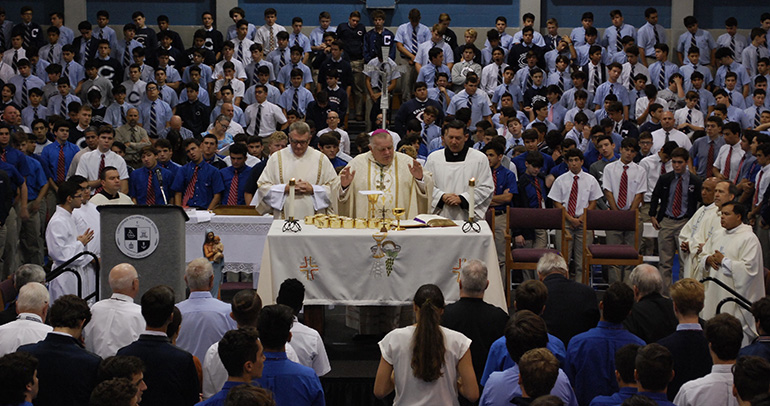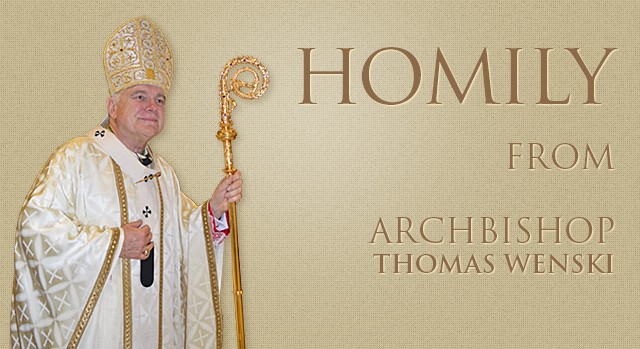By Archbishop Thomas Wenski - The Archdiocese of Miami

Photographer: COURTESY
Archbishop Thomas Wenski celebrates an all-school Mass Aug. 30 marking the start of the 60th school year at the Marist Brothers' Christopher Columbus High School in Miami.
Archbishop Thomas Wenski preached this homily during a Mass Aug. 30, 2018, at Christopher Columbus High School in Miami.
This academic year, Christopher Columbus High School � like the Archdiocese � celebrates its 60th anniversary � and no, Brother Kevin wasn’t here when the school was founded in 1958. But he’s been here for many of those years � and over those years Christopher Columbus has existed to help young men like yourselves to be not only good students but also good disciples of the Lord Jesus Christ. To become a disciple is to set out on a great adventure with Jesus who calls us each by name and says: “Follow me.”
You could say that a Catholic school, like Christopher Columbus is called to be, should awaken within us the ability to hear the Lord’s invitation to follow him; and a Catholic school, with its emphasis on discipline and character and excellence, should equip us with the courage to act on that invitation � and thus to follow him as we make our journey through life.
It is how we respond to this invitation that will determine the direction our lives will take. And if Christopher Columbus is old enough to have 60 years behind it, you, students, are young enough to have 60 years ahead of you. Where is your life going to take you? What are you going do with the next 60 years?
You are young! Your life’s journey still lies before you. And you are Americans � as Americans, “you are offered many opportunities for personal development, and you are brought up with a sense of generosity, service and fairness.” But “there are also difficulties: activities and mindsets which stifle hope, pathways which seem to lead to happiness and fulfillment but in fact end only in confusion and fear.” (Pope Benedict XVI)
Being a Catholic Christian means simply to commit ourselves to walk in the Lord’s footsteps even when our path takes us through twists and turns, through the joys and trials of ordinary life. With the Holy Spirit to strengthen and guide us along the way, our own lives then become a journey of hope.
What are your plans? What do you want to do with your life? Or as your grandparents might ask you: What do you want to be when you grow up? Well, today, I would ask you to consider this question from a different perspective. Instead of asking, what are my plans; what do I want to do; ask instead: What is God’s plan for my life? What does he want me to do with my life?
What is God’s plan for your life? God does have a plan for each one of us � for in God’s eyes, no one is an accident. “Each of us is the result of a thought of God. Each of us is willed, each of us is loved, each of us is necessary”. (Pope Benedict 4/24/05) We find a general outline of God’s plan for us in Jesus’ words to his disciples: “Just as I have loved you, you also should love one another.” (John 13:34) God calls each one of us to a future of love. To give your very self as a gift to God and to your brothers and sisters, as Jesus did when he died for us on the cross, is the way to true joy and happiness. This is not an easy way; but it is the way, God’s way.
Dare, then, to love as Christ loves. Loving in this way is like learning to speak a new language well or play a new sport.
Before you can speak a new language well, you have to learn the grammar. Grammar might seem to be all about rules and regulations. And to love like Jesus means learning the rules and regulations about self-control, purity of heart and mind, it is about learning how to deny oneself, to respect others, to serve instead of being served. And as you learn the grammar, you have to practice, practice, practice�
It’s the same way in learning a new sport. You might have heard about Michael Jordan? But I am sure you have heard of LeBron James. (Some say Jordan is the best basketball player of all time; others say it’s LeBron. I’m not going to get into that debate but you know that LeBron played high school basketball at a Catholic high school.). Let’s just say that there two of the greatest basketball players of all times. But that does not mean that they could ignore the rules and regulations of basketball. Or that they didn’t have to practice hard at it. In fact, knowing and keeping the rules make it easier, not harder, to play the game. In the same way, the Commandments, the rules and regulations of Christian living, give us the freedom to embrace a future of love. Every player might commit a foul from time to time � just like a Christian may commit a sin through human weakness; but you can’t play a great game if you foul out, or live a fulfilling, happy life by ignoring the commandments and giving into sin.
Just as a LeBron James or a Michael Jordan can teach us about the game of basketball, the saints can teach us life and about how to love as Jesus did. We might not all be basketball stars but we are called “to be holy,” we are called to “fellowship” with Jesus Christ. In other words, we are called to be the best version of ourselves, that version of ourselves that God wants us to be.
In the lives of the saints, we find remarkable journeys of hope: They trusted God confident that he was their final destination; and each one � in different ways to be sure � but each one offered an outstretched hand of hope to those they met along the way. But as they made their life’s journey, Jesus was their constant companion � and they constantly conversed with him along the way.
Lest we be daunted by the challenges before us, Christ assures us that he remains with us � Christ will be with us this year, and for the next 60 years, even til the end of time.

